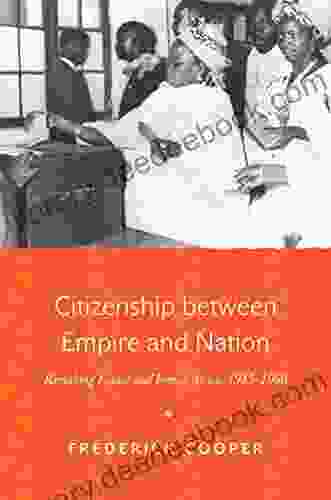Remaking France and French Africa, 1945-1960: Decolonization, Development, and the End of Empire

The period from 1945 to 1960 was a time of profound transformation for France and its African colonies. The Second World War had shattered the old order, and the postwar years saw the rise of new political movements and ideologies. In Africa, the desire for independence grew stronger, and France was forced to confront the challenges and opportunities of decolonization.
5 out of 5
| Language | : | English |
| File size | : | 4606 KB |
| Text-to-Speech | : | Enabled |
| Enhanced typesetting | : | Enabled |
| Print length | : | 504 pages |
| Screen Reader | : | Supported |
This article explores the process of decolonization in French Africa from 1945 to 1960. It examines the political, economic, and social changes that took place during this period, and the challenges and opportunities that emerged for France and its former colonies.
The Political Landscape
The political landscape of French Africa was transformed in the wake of the Second World War. The old colonial system, based on direct rule from Paris, was increasingly challenged by African nationalists who demanded independence and self-government. In 1946, France granted limited autonomy to its colonies through the Brazzaville Conference, but this did not satisfy the growing demands for independence.
In the early 1950s, a new wave of nationalism emerged in French Africa. Led by charismatic leaders such as Kwame Nkrumah in Ghana and Léopold Sédar Senghor in Senegal, these movements demanded complete independence from France. In 1958, France agreed to grant independence to its colonies through the referendum on the Constitution of the Fifth Republic. Most colonies voted for independence, and by 1960, all of French Africa had become independent states.
The Economic Landscape
The economic landscape of French Africa also underwent significant changes in the postwar period. The war had disrupted trade and investment, and the colonies were facing severe economic problems. In response, France launched a series of development plans aimed at stimulating economic growth and improving living standards in its colonies.
The most ambitious of these plans was the Fonds d'Investissement pour le Développement Économique et Social (FIDES),which was established in 1946. FIDES invested heavily in infrastructure, education, and health care in the colonies. While these investments did help to improve living standards, they also created a dependency on France for economic assistance.
The Social Landscape
The social landscape of French Africa also changed in the postwar period. The war had led to a breakdown of traditional social structures, and the influx of new ideas and values from the West contributed to a process of social and cultural transformation.
One of the most significant changes was the rise of a new African elite. This elite was educated in French schools and universities, and it played a leading role in the nationalist movements that demanded independence. The new elite also played a key role in the development of new political and economic institutions in the post-independence period.
Challenges and Opportunities
The process of decolonization in French Africa was not without its challenges. France was reluctant to give up its colonies, and there were often violent clashes between French forces and African nationalists. The new independent states also faced a number of economic and political challenges, including poverty, corruption, and ethnic conflict.
Despite these challenges, the decolonization of French Africa also presented a number of opportunities. The new independent states were able to chart their own course and develop their own unique identities. They also played an important role in the emergence of a new Afro-Asian bloc in international affairs.
The period from 1945 to 1960 was a time of profound transformation for France and its African colonies. The process of decolonization was complex and difficult, but it ultimately led to the emergence of new independent states in Africa. These new states faced a number of challenges, but they also had the opportunity to create their own unique identities and play an important role in the world.
5 out of 5
| Language | : | English |
| File size | : | 4606 KB |
| Text-to-Speech | : | Enabled |
| Enhanced typesetting | : | Enabled |
| Print length | : | 504 pages |
| Screen Reader | : | Supported |
Do you want to contribute by writing guest posts on this blog?
Please contact us and send us a resume of previous articles that you have written.
 Book
Book Novel
Novel Genre
Genre Paperback
Paperback Magazine
Magazine Paragraph
Paragraph Sentence
Sentence Bookmark
Bookmark Glossary
Glossary Bibliography
Bibliography Preface
Preface Synopsis
Synopsis Annotation
Annotation Footnote
Footnote Manuscript
Manuscript Tome
Tome Bestseller
Bestseller Classics
Classics Library card
Library card Narrative
Narrative Autobiography
Autobiography Memoir
Memoir Encyclopedia
Encyclopedia Narrator
Narrator Resolution
Resolution Librarian
Librarian Card Catalog
Card Catalog Borrowing
Borrowing Archives
Archives Periodicals
Periodicals Scholarly
Scholarly Lending
Lending Reserve
Reserve Special Collections
Special Collections Study Group
Study Group Dissertation
Dissertation Storytelling
Storytelling Awards
Awards Book Club
Book Club Theory
Theory Gareth Edwards
Gareth Edwards Irma Garcia Rios
Irma Garcia Rios Sunil Bharitkar
Sunil Bharitkar Sam Bing
Sam Bing Lawrence Douglas
Lawrence Douglas Ketan Joshi
Ketan Joshi Martin Alaimo
Martin Alaimo Kenneth J Schoon
Kenneth J Schoon N J Hammer
N J Hammer Baby Professor
Baby Professor Tony A Plate
Tony A Plate Theo Gaius
Theo Gaius Kristin White
Kristin White Wayne Marshall
Wayne Marshall Katie Winters
Katie Winters John Bailey
John Bailey Tim Pletcher
Tim Pletcher J Gavin Paul
J Gavin Paul Tania Pouli
Tania Pouli Clive Forth
Clive Forth
Light bulbAdvertise smarter! Our strategic ad space ensures maximum exposure. Reserve your spot today!

 Felix CarterCursed Legacy: The Tragic Life of Klaus Mann, a Literary Prodigy Haunted by...
Felix CarterCursed Legacy: The Tragic Life of Klaus Mann, a Literary Prodigy Haunted by... Daniel KnightFollow ·2.3k
Daniel KnightFollow ·2.3k Reed MitchellFollow ·2.3k
Reed MitchellFollow ·2.3k Gerald BellFollow ·10.3k
Gerald BellFollow ·10.3k Edgar HayesFollow ·16k
Edgar HayesFollow ·16k Chadwick PowellFollow ·10.8k
Chadwick PowellFollow ·10.8k Asher BellFollow ·10.5k
Asher BellFollow ·10.5k Dominic SimmonsFollow ·6.1k
Dominic SimmonsFollow ·6.1k Carter HayesFollow ·7.3k
Carter HayesFollow ·7.3k

 Ralph Ellison
Ralph EllisonHealth Care Global Viewpoints: Samantha Whiskey
Samantha Whiskey is a global health...

 Gabriel Garcia Marquez
Gabriel Garcia MarquezTeacher Educators' Reflections on Culturally Relevant...
In today's...

 Levi Powell
Levi PowellSustainable Project Management: The GPM Reference Guide...
In today's rapidly changing world,...

 Isaac Bell
Isaac BellThe Captivating World of "Dreaming Awake Falling Under"
A Journey Through...

 Clarence Brooks
Clarence BrooksGovernance Regulations Valuations Mergers And...
In today's complex and ever-changing...
5 out of 5
| Language | : | English |
| File size | : | 4606 KB |
| Text-to-Speech | : | Enabled |
| Enhanced typesetting | : | Enabled |
| Print length | : | 504 pages |
| Screen Reader | : | Supported |












